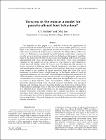| dc.contributor.author | HOLLAND, CELIA | en |
| dc.date.accessioned | 2010-06-17T15:30:26Z | |
| dc.date.available | 2010-06-17T15:30:26Z | |
| dc.date.issued | 2001 | en |
| dc.date.submitted | 2001 | en |
| dc.identifier.citation | Holland, C. and Cox, D., Toxocara in the mouse : A model for parasite-altered host behaviour ?, Journal of Helminthology (Special issue on Toxocara), 75, 2, 2001, 125 - 135 | en |
| dc.identifier.other | Y | en |
| dc.identifier.uri | http://hdl.handle.net/2262/40182 | |
| dc.description | PUBLISHED | en |
| dc.description.abstract | The objective of this paper is to critically evaluate the significance of parasite-altered host behaviour in the Toxocara mouse model particularly in the light of the Manipulation Hypothesis. Murine behaviours were examined in both outbred and inbred strains of mice infected with different doses of Toxocara canis ova. Behaviours investigated included activity, exploration, response to novelty, anxiety, learning, memory and social behaviour. Subsequent modifications to the behaviour of infected mice were investigated with respect to dose administered and larval accumulation in the brain. There was substantial variation in the number of larvae recovered from brains of individual mice, which received similar doses of Toxocara ova. Furthermore, the numbers of larvae recovered at different doses differed significantly between an outbred and inbred strain of mouse. Alterations in infected host behaviour occurred and were related to the number of larvae recovered from the brain. For social behaviour in outbred mice, a high infection in the brain reduced levels of aggressive behaviour and increased levels of flight and defensive behaviours. In contrast, outbred mice with a low infection in the brain displayed a greater level of risk behaviour in respect of predator odour and the light/dark box compared to control or high infection mice. Post-infection, outbred mice were more immobile whereas inbred mice showed reduced immobility and increased digging and climbing. Impaired learning ability was observed in outbred mice with moderate and high levels of infection in the brain compared to control and low infection mice. Toxocara infection has an impact upon a diverse range of murine behaviours with little evidence for a specific and hence an adaptive alteration. Many of the effects on murine host behaviour by Toxocara are likely to be pathological side effects of infection rather than as a consequence of adaptive host-manipulation. Observed changes in murine behaviour may be relevant to human toxocariasis. | en |
| dc.format.extent | 125 | en |
| dc.format.extent | 135 | en |
| dc.language.iso | en | en |
| dc.relation.ispartofseries | Journal of Helminthology (Special issue on Toxocara) | en |
| dc.relation.ispartofseries | 75 | en |
| dc.relation.ispartofseries | 2 | en |
| dc.rights | Y | en |
| dc.subject | Zoology | en |
| dc.subject | Parasitology | en |
| dc.subject | Toxocara canis | en |
| dc.title | Toxocara in the mouse : A model for parasite-altered host behaviour ? | en |
| dc.type | Journal Article | en |
| dc.type.supercollection | scholarly_publications | en |
| dc.type.supercollection | refereed_publications | en |
| dc.identifier.peoplefinderurl | http://people.tcd.ie/cholland | en |
| dc.identifier.rssinternalid | 28741 | en |
| dc.identifier.rssuri | http://dx.doi.org/10.1079/JOH200169 | en |




